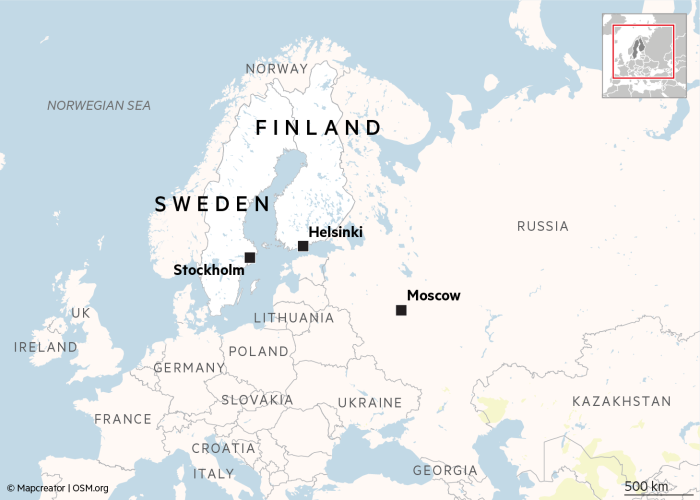[ad_1]
Receive free Nato updates
We’ll send you a myFT Daily Digest email rounding up the latest Nato news every morning.
President Vladimir Putin has insisted during the crisis over Ukraine that Nato should stop its encroachment towards Russia’s borders. But his demand is having unintended consequences in Europe’s far north, reviving talk of whether Finland and Sweden should join the military alliance.
As the world’s attention focuses on the Russian troops massing on Ukraine’s border, leaders from across the political spectrum in both Nordic countries have stressed that they have the option to apply for membership at any time.
“The debate is vivid and unprecedented. A lot is going on. A lot depends on what happens next,” said Henri Vanhanen, foreign policy and EU adviser to the centre-right National Coalition party, Finland’s main opposition group and a proponent of Nato membership.
Swedish and Finnish foreign ministers met Nato secretary-general Jens Stoltenberg in Brussels on Monday, the latest in a series of diplomatic conversations that have included Finnish president Sauli Niinisto speaking to both his US and Russian counterparts in recent days.
“Nato’s door remains open . . . Sweden and Finland are our closest partners,” Stoltenberg said after the meeting.
Pekka Haavisto, Finland’s foreign minister, said: “Finland is not a member of Nato, but maintaining the national room to manoeuvre and freedom of choice are also integral parts of Finland’s foreign, security and defence policy.”
Both Nordic countries, which gave up their traditional neutrality because of their membership of the EU and its mutual defence clause, have grown closer to Nato in recent years, allowing its troops to cross their territory in times of crisis or during exercises.
Russia has threatened a sharp response should Nato expand further by including the two countries around the Baltic Sea. The foreign ministry in Moscow said in December that Sweden and Finland joining Nato “would have serious military and political consequences that would require an adequate response from the Russian side”.

Anna Wieslander, director of northern Europe at US think-tank Atlantic Council, said Russia’s own actions were pushing Sweden and Finland to consider a move that Moscow did not want.
“If we are in a comfortable place in Sweden, then there’s not much push to change our security policy. There are other issues that are more important. You need that external threat and that’s counter-productive for Russia,” she added.
Ann Linde, Sweden’s foreign minister, said she was “deeply concerned” about Russia’s intentions towards Ukraine and its “aggressive rhetoric”, while stressing that it was important to have met Nato together with Finland.
Sweden and Finland have recently deepened their defence co-operation with each other and there has long been an assumption that the two countries would act in lockstep on any move to join Nato.
Observers believe the debate around joining Nato is deeper in Finland, perhaps reflecting the fact that it has never let its military guard down, maintaining heavy defence spending and a large pool of reservists, while Sweden ended conscription and cut back heavily on its forces.
Since the nadir of the early 2010s, when Sweden’s defence commander conceded it could not defend itself for more than a week and the country was unable to scramble jets as Russia practised a dummy bombing raid on Stockholm, Sweden has upped its military spending and reinstated conscription.

Stockholm appears more politically divided over Nato than Helsinki. The ruling centre-left Social Democrats are firmly against membership, while the centre-right opposition is united in wanting to join.
In Finland, centre-left prime minister Sanna Marin caused consternation last week when she said it was “very unlikely” that the country would apply for membership during her term in office. Under heavy criticism from an opposition that maintains that Finland should keep its options open, Marin said her comments had been “overinterpreted”.
Still, many in Helsinki repeat the half-joke that Finland is only “one sauna” away from joining Nato, meaning that the party leaders and president could decide quickly — in a sauna or not — to apply for membership if circumstances dictated.
“If Finland was in a serious consideration of Nato membership, we probably wouldn’t even know it at this point. It’s not wise to show your cards beforehand,” said Vanhanen.
He added that Finland used its Nato option as a “deterrent” in its foreign policy, keeping its strategy and plan vague and its public pronouncements subtle. Finland recently raised its military readiness, but gave no details.

Sweden, on the other hand, sent convoys of military vehicles down motorways and on passenger ferries to the island of Gotland — often compared to an aircraft carrier in the Baltic Sea — in a highly visible response to Russian ships in the vicinity.
“I used to think that Sweden would have to take the lead, as we’re the biggest Nordic country. But given how the dynamics are now, I would bet more that it could start moving quicker in Helsinki than Stockholm,” said Wieslander.
The debate is not purely about what Nato membership could mean for Sweden and Finland, but also about what the two countries — with their crucial strategic position in northern Europe — could bring to the military alliance.
Kaja Kallas, Estonia’s prime minister, told the Financial Times the decision would be for Sweden and Finland only. But she added: “If they decide to do so, we would be strong supporters for them in Nato.”
Kallas noted that they would add strong military capabilities and help the three Baltic states “who are like a peninsula in terms of Nato”. She added: “It would definitely strengthen the security situation here.”
[ad_2]
Source link
